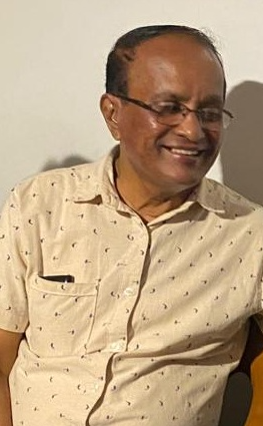by Tyron Devotta
We live in an era dominated by citizen journalism and an overwhelming flow of mainstream media that spans the globe. From the moment we wake to the moment we sleep, we're inundated with information—scrolling, tapping, swiping, constantly seeking meaning in fleeting soundbites and bite-sized clips. In this relentless churn, the noble art of journalism—built on patience, persistence, and principle—often fades into the background, overlooked and at times forgotten.
So, if one of the old guard were to fall, would it be like a tree crashing in a forest—would anyone even notice?
Premalal Wijeratne passed away early this morning, surrounded by his family. It was a heart attack, an ailment he’d quietly lived with, perhaps for the last 25 years. He was, first and foremost, a devoted family man, a loving husband and father. But beyond the bounds of his home, he was something rare: a man who genuinely cared. Even his enemies were not beyond his concern. If he knew someone was in trouble, he would move mountains to help. What some saw as obsession, others experienced as salvation. He had a gift for pulling off the impossible, smoothing jagged edges with quiet force and relentless commitment.
For me, he was something more. He was one of the best old-school journalists I’ve ever known — literally a bloodhound. He could unravel the most tangled story, chasing it down with a kind of dogged brilliance that’s hard to come by today. He did something few journalists do anymore i.e. he followed through. Even after a story hit the headlines, he would stay with it, track its ripples, and make sure it reached a real, meaningful conclusion. In a media landscape obsessed with speed and novelty, this alone made him exceptional.
Today, stories are assembled like instant noodles, two minutes and done. But Premalal came from a different tradition. His journalism was built slowly, with care and rigour. He verified, cross-verified, and triple-checked. He never relied on a single source, and often had more than three. It wasn’t just about facts; it was about truth. The story behind the story. “A journalist must have a nose,” he used to tell me — meaning, a scent for what lies beneath. That, perhaps, is what modern journalism misses the most.
His notebook, which was battered and bruised, was a testimony of the journey he took with each and every story; a virtual mind map of information that wound its way through intricate investigations. It was filled with phone numbers, notes on conversations he had with his contacts, and even his thoughts and doubts. A treasure trove of information gathering in the traditions of Woodward and Bernstein.
I first met Premalal 45 years ago, when I was a cub reporter at The Sun. He was already a respected senior at the sister paper, Dawasa. Back then, he was the news editor, one of the top jobs given only to the most seasoned veterans. Later, we worked together at The Sunday Leader, where he handled the police round, as he always had. He later joined me again, in the News 1st newsroom.
Premalal brought his old-school values with him and never let them go. In a fast-paced TV and radio newsroom full of young people, that sometimes caused friction. But as News Director, I didn’t bring him in to adapt. I brought him in to anchor us in integrity. And that he did, especially in the most sensitive areas — police, parliament, and court reporting where he found the right people to manage these areas. He shaped the foundation of that newsroom, even going on to manage Sirasa Radio, a flagship outlet in our multi-platform, multicultural news operation.
Over time, though, his refusal to change became a burden. He couldn’t type his own stories because he didn’t know how to use a computer. And in a newsroom that increasingly demanded journalists to produce their own video, audio, and text, he slowly became an outsider, and eventually, he had to move on.
But that wasn’t the end for him. He returned to print journalism and continued contributing to various papers, staying active until the very end. Journalism was in his blood, and he never stopped.
Premalal Wijeratne will go down as one of the greatest investigative journalists this country has known. His name deserves a place in our Hall of Fame. His passing leaves a void; not just for his family, but for all of us who knew that we could call him in a desperate moment, when we needed justice, or help, or simply hope. For me, he is no longer at the other end of the line, and no one can take his place.
Sleep well, my friend. You lived your life with honour, belief, and unwavering faith. A just reward awaits you now, as you begin your next assignment. I will always have you in my heart.



